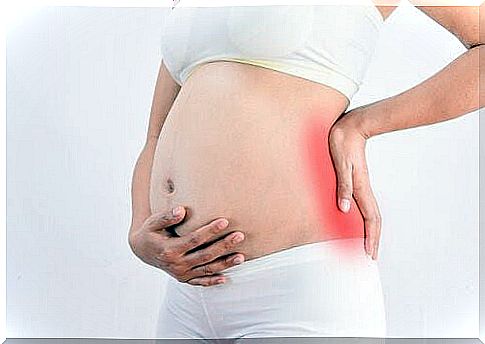Possible Causes Of Abdominal Pain During Pregnancy

During pregnancy, a woman’s body undergoes many changes. The most notable is the growing belly. The question is, when do you need to worry about abdominal pain during pregnancy and when is it completely normal?
During pregnancy, the body becomes more sensitive to certain stimuli, which results in nausea and vomiting. Another common symptom is cramps in the abdominal region.
It is common to experience small cramps and pinches of abdominal pain during pregnancy, especially in the beginning, just as contractions are common in the last months. As long as these abdominal pains are sporadic and mild, there is no need to worry about them.
Mild stomach cramps are usually the result of gas in the stomach or constipation caused by certain pregnancy hormones that slow down digestion. It may also have to do with stretching the ligaments that support the uterus.
This can sometimes happen if you have exercised or made sudden movements.
When should I worry about abdominal pain during pregnancy?
If the pain you are experiencing is strong and persistent, you should see a doctor as soon as possible. In addition, if you get a fever or other unpleasant symptoms, it may be a sign that something is wrong.
It is possible that you have a virus or an infection, so you should seek medical attention immediately.
There are several other serious problems that can also cause abdominal pain during pregnancy. Some of them, such as appendicitis and peritonitis, are not directly related to pregnancy.
An appendicitis usually requires a simple surgical procedure. In the case of peritonitis, the risk increases, because inflammation of the peritoneum is very dangerous.

Problems related to pregnancy
Ectopic pregnancy, also known as ectopic pregnancy
When semen meets an egg from an ovulation, outside the uterus – usually in the fallopian tubes – this can result in an ectopic pregnancy.
The symptoms of a ectopic pregnancy include heavy bleeding, pain in the abdomen and pelvis and discomfort in the shoulders.
Pain in the shoulders is due to an accumulation of blood in the membrane, which can occur if one of the fallopian tubes is damaged.
There are very rare exceptions, but usually a fetus that develops outside the womb cannot survive. Treatment usually means that the pregnancy ends – either through an operation or administration of methotrexate.
Miscarriage
Miscarriage is a very common cause of severe abdominal pain during pregnancy. It then usually occurs between week 13 and week 20 and can mean heavy bleeding. It can also include seizures and sudden loss of pregnancy symptoms.
This is a very sad situation for parents, but it is important to remember that nature is wise. If the embryo is not ready to survive, it is best for the body to get rid of it.
Keep in mind that future pregnancies may be more successful.
Placenta discharge
Placental abruption is an unusual but serious complication during pregnancy. It occurs when the placenta partially or completely separates from the uterus before birth.
In some cases, a discharge means a large blood loss, which makes the situation even more dangerous.
Placental abruption can cause cramps, contractions and abdominal pain. A woman who goes through this can no longer feel the movements of the fetus.
Most cases of placental abruption occur in the third trimester and may be an indication of a premature birth.

Pregnancy toxicosis
Pregnancy toxicosis is a condition that can be diagnosed due to high arterial pressure and the presence of proteins in the urine. The most severe cases can cause loss of vision as well as severe headaches.
An inability to breathe properly and swelling in the body are also common symptoms of pregnancy toxicosis. Another possible sign is sudden, unexplained weight gain, which occurs because the woman retains water in the body.
If you notice any of these symptoms, you should seek medical attention immediately. Untreated pregnancy toxicosis can lead to damage to the brain, liver, kidneys and the fetus itself.
Premature birth
A premature birth is one that occurs before the 37th week of pregnancy. It is always preceded by contractions, which is an indication that the baby is on its way. The pressure increases, as does the secretion of fluids and fluid from the vagina.
Nowadays, premature births are usually not a serious danger. Medical advances have made it possible for premature babies to survive after as little as six months of pregnancy.
It is something that was inconceivable half a century ago, and is largely due to the use of incubators.
If you are in any of the above situations, the most important thing is to stay calm, while you immediately consult a doctor. The calmer you are, the easier it will be and the milder the pain will be.









